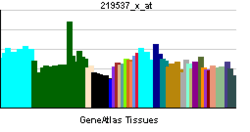DLL3
| DLL3 | |||||||||||||||||
|---|---|---|---|---|---|---|---|---|---|---|---|---|---|---|---|---|---|
| Identifiers | |||||||||||||||||
| Aliases | DLL3, SCDO1, pu, pudgy, delta like canonical Notch ligand 3 | ||||||||||||||||
| External IDs | MGI: 1096877 HomoloGene: 7291 GeneCards: DLL3 | ||||||||||||||||
| |||||||||||||||||
| RNA expression pattern | |||||||||||||||||
 | |||||||||||||||||
| More reference expression data | |||||||||||||||||
| Orthologs | |||||||||||||||||
| Species | Human | Mouse | |||||||||||||||
| Entrez | |||||||||||||||||
| Ensembl | |||||||||||||||||
| UniProt | |||||||||||||||||
| RefSeq (mRNA) | |||||||||||||||||
| RefSeq (protein) | |||||||||||||||||
| Location (UCSC) | Chr 19: 39.5 – 39.51 Mb | Chr 7: 28.29 – 28.3 Mb | |||||||||||||||
| PubMed search | [1] | [2] | |||||||||||||||
| Wikidata | |||||||||||||||||
| View/Edit Human | View/Edit Mouse |
Delta-like 3 (Drosophila), also known as DLL3, is a protein which in humans is encoded by the DLL3 gene.[3] Two transcript variants encoding distinct isoforms have been identified for this gene.
Function
This gene encodes a member of the delta protein ligand family. This family functions as Notch ligands that are characterized by a DSL domain, EGF repeats, and a transmembrane domain.[4]
Clinical significance
Mutations in this gene cause the autosomal recessive genetic disorder Jarcho-Levin syndrome.[5]
References
- ↑ "Human PubMed Reference:".
- ↑ "Mouse PubMed Reference:".
- ↑ Turnpenny PD, Bulman MP, Frayling TM, Abu-Nasra TK, Garrett C, Hattersley AT, Ellard S (July 1999). "A gene for autosomal recessive spondylocostal dysostosis maps to 19q13.1-q13.3". Am. J. Hum. Genet. 65 (1): 175–82. doi:10.1086/302464. PMC 1378088
 . PMID 10364530.
. PMID 10364530. - ↑ "Entrez Gene: DLL3 delta-like 3 (Drosophila)".
- ↑ Bulman MP, Kusumi K, Frayling TM, McKeown C, Garrett C, Lander ES, Krumlauf R, Hattersley AT, Ellard S, Turnpenny PD (April 2000). "Mutations in the human delta homologue, DLL3, cause axial skeletal defects in spondylocostal dysostosis". Nat. Genet. 24 (4): 438–41. doi:10.1038/74307. PMID 10742114.
External links
Further reading
- Turnpenny PD, Bulman MP, Frayling TM, et al. (1999). "A gene for autosomal recessive spondylocostal dysostosis maps to 19q13.1-q13.3.". Am. J. Hum. Genet. 65 (1): 175–82. doi:10.1086/302464. PMC 1378088
 . PMID 10364530.
. PMID 10364530. - Bulman MP, Kusumi K, Frayling TM, et al. (2000). "Mutations in the human delta homologue, DLL3, cause axial skeletal defects in spondylocostal dysostosis.". Nat. Genet. 24 (4): 438–41. doi:10.1038/74307. PMID 10742114.
- Dunwoodie SL, Clements M, Sparrow DB, et al. (2002). "Axial skeletal defects caused by mutation in the spondylocostal dysplasia/pudgy gene Dll3 are associated with disruption of the segmentation clock within the presomitic mesoderm.". Development. 129 (7): 1795–806. PMID 11923214.
- Strausberg RL, Feingold EA, Grouse LH, et al. (2003). "Generation and initial analysis of more than 15,000 full-length human and mouse cDNA sequences.". Proc. Natl. Acad. Sci. U.S.A. 99 (26): 16899–903. doi:10.1073/pnas.242603899. PMC 139241
 . PMID 12477932.
. PMID 12477932. - Turnpenny PD, Whittock N, Duncan J, et al. (2003). "Novel mutations in DLL3, a somitogenesis gene encoding a ligand for the Notch signalling pathway, cause a consistent pattern of abnormal vertebral segmentation in spondylocostal dysostosis.". J. Med. Genet. 40 (5): 333–9. doi:10.1136/jmg.40.5.333. PMC 1735475
 . PMID 12746394.
. PMID 12746394. - Bonafé L, Giunta C, Gassner M, et al. (2004). "A cluster of autosomal recessive spondylocostal dysostosis caused by three newly identified DLL3 mutations segregating in a small village.". Clin. Genet. 64 (1): 28–35. doi:10.1034/j.1399-0004.2003.00085.x. PMID 12791036.
- Whittock NV, Ellard S, Duncan J, et al. (2005). "Pseudodominant inheritance of spondylocostal dysostosis type 1 caused by two familial delta-like 3 mutations.". Clin. Genet. 66 (1): 67–72. doi:10.1111/j.0009-9163.2004.00272.x. PMID 15200511.
- Gerhard DS, Wagner L, Feingold EA, et al. (2004). "The status, quality, and expansion of the NIH full-length cDNA project: the Mammalian Gene Collection (MGC).". Genome Res. 14 (10B): 2121–7. doi:10.1101/gr.2596504. PMC 528928
 . PMID 15489334.
. PMID 15489334. - Maisenbacher MK, Han JS, O'brien ML, et al. (2005). "Molecular analysis of congenital scoliosis: a candidate gene approach.". Hum. Genet. 116 (5): 416–9. doi:10.1007/s00439-005-1253-8. PMID 15717203.
- Otsuki T, Ota T, Nishikawa T, et al. (2007). "Signal sequence and keyword trap in silico for selection of full-length human cDNAs encoding secretion or membrane proteins from oligo-capped cDNA libraries.". DNA Res. 12 (2): 117–26. doi:10.1093/dnares/12.2.117. PMID 16303743.
This article is issued from Wikipedia - version of the 9/26/2016. The text is available under the Creative Commons Attribution/Share Alike but additional terms may apply for the media files.